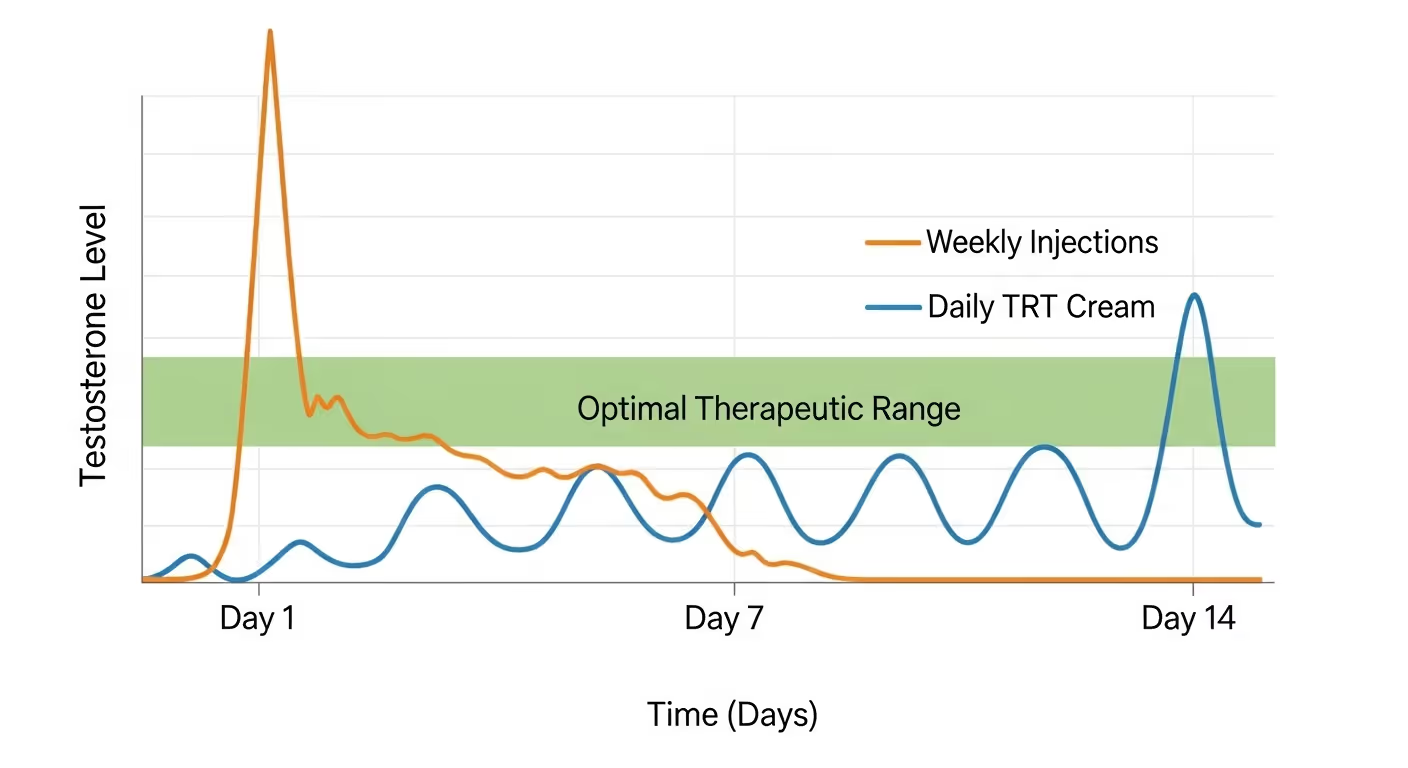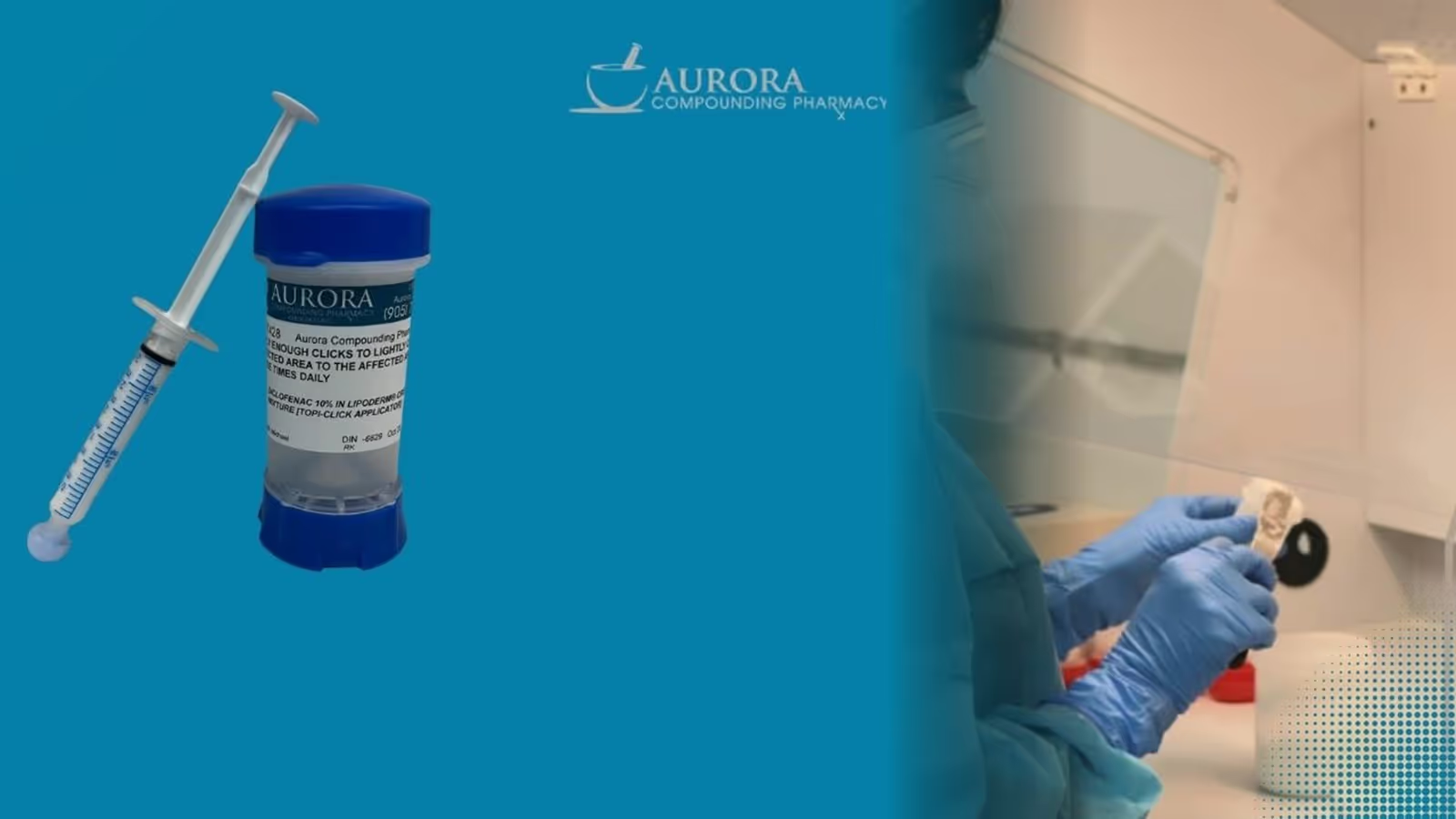By Michael Khalil, B.Sc.Pharm, RPh, Chief Pharmacist, Aurora Compounding Pharmacy
(Professional observations, not medical advice. Always consult a licensed physician before starting hormone therapy.)
Rethinking TRT and Why Your Delivery Method Matters
For decades, testosterone replacement therapy (TRT) has supported men in restoring energy, focus, and vitality. In 2025, the question is no longer whether to treat low testosterone, but how. With the testosterone therapy market projected to exceed USD 4.36 billion by 2030, understanding delivery methods matters more than ever.
At Aurora Compounding Pharmacy, many patients begin with injectable testosterone but later report challenges such as fluctuating energy or mood. Based on both research and clinical experience, some men may find that custom-compounded topical testosterone creams provide a steadier absorption profile and can help reduce variability in response.

Learn more about one pharmacist’s real-world insights in our feature article, Honest Review: Testosterone Replacement Therapy (TRT).
The Rising Challenge of Low Testosterone in Men
Low testosterone levels can affect energy, motivation, libido, and cognitive function. According to The Journal of Clinical Endocrinology & Metabolism (2020), up to 40% of men over 45 may meet clinical criteria for deficiency (PubMed). TRT aims to restore hormone balance and improve symptoms, but outcomes depend heavily on the delivery method and consistent, monitored use.
Transdermal vs Injectable Testosterone: A Matter of Rhythm and Stability
Injectable TRT delivers testosterone directly into muscle tissue, creating a rapid peak that declines until the next dose. Transdermal testosterone creams and gels are applied daily and absorbed gradually through the skin, maintaining more consistent concentrations.
A 2022 study in Andrology reported that transdermal users experienced fewer hormone fluctuations and more stable levels compared with those on injections (PubMed). In Aurora’s practice, some men transitioning from injections to creams have reported steadier energy and focus after several weeks.
Traditional TRT Works but Comes With Drawbacks
Injectable testosterone remains an effective therapy and an important option for many patients. However, The Journal of Urology (2021) noted that men using injectable formulations showed higher increases in hematocrit compared with topical users (PubMed). Elevated hematocrit can increase blood viscosity and warrants monitoring.
Beyond physiology, injections may feel invasive or inconvenient for patients who prefer a daily topical routine.
Why Custom Compounded TRT Creams May Offer a Personalized Approach
Commercial testosterone gels provide standardized strengths, while custom-compounded TRT creams allow personalization in concentration, base, and absorption characteristics.
A 2020 study in Current Medical Research and Opinion found that individualized transdermal preparations were associated with improved patient satisfaction and fewer reported local reactions compared with fixed-dose products (PubMed). Custom compounding can also allow adjustments to include absorption enhancers or hypoallergenic bases suited to the individual.
Understanding the Limitations of Testosterone Injections
The Hormonal Cycle
Weekly or biweekly injections can cause pronounced highs followed by lows. The Aging Male (2022) observed that such variability may contribute to mood or energy changes between doses (PubMed).
Local Discomfort and Systemic Considerations
Repeated injections may cause tenderness, bruising, or inflammation at the injection site. Endocrine Reviews (2018) noted potential long-term tissue changes from intramuscular administration (PubMed). In some patients, transient spikes in testosterone have been linked to increased estrogen conversion and red-blood-cell production (JAMA Network Open, 2021; PubMed).
Frequently Asked Questions
Is there a side effect of taking testosterone injections?
Injection therapy can cause temporary pain, bruising, or irritation at the site and may lead to hormonal fluctuations. Excess testosterone can convert to estrogen, potentially causing water retention or breast-tissue tenderness.
How do custom TRT creams differ in side-effect profile?
They deliver testosterone gradually through the skin, which may help maintain steadier levels. Therapeutic Advances in Endocrinology and Metabolism (2020) reported that transdermal delivery was associated with fewer adverse effects tied to hormonal peaks (PubMed).
Why might someone consider a topical TRT cream?
Many men choose a daily, needle-free routine for comfort and convenience. The goal is to maintain consistent hormone exposure and support treatment adherence.
What are the main features of custom TRT creams?
- Daily, steady absorption
- Adjustable dosing precision
- No injection discomfort
- Non-greasy, hypoallergenic formulations
How Custom TRT Creams Support Better Monitoring and Control
Maintaining Consistency
Daily application supports steady hormone levels, which may contribute to emotional and physical stability. Endocrine Connections (2022) found that transdermal users reported improved well-being compared with fluctuating regimens (PubMed).
Lower Estrogen Conversion
Stable testosterone levels are less likely to overstimulate aromatase activity, reducing estrogen-related side effects in some men.
Avoiding Injection-Site Irritation
Topical therapy eliminates the need for needles, removing risks of localized pain or infection.
Individual Adjustments
If mild androgenic effects such as acne occur, the pharmacist can collaborate with the prescriber to adjust strength or base promptly.
For a detailed breakdown of lab tests and follow-up essentials, read our next guide - TRT Monitoring Checklist.
The Custom Advantage: Precision Through Collaboration
A review in Frontiers in Endocrinology (2023) suggested that personalized hormone-therapy programs improved patient-reported outcomes compared with fixed dosing (PubMed). At Aurora Compounding Pharmacy, each formulation is tailored to the individual’s absorption rate and laboratory data. Our pharmacists work closely with physicians nationwide to adjust therapy safely and effectively over time.
Addressing Common Concerns About Topical TRT Creams
Skin Irritation: We use alcohol-free, hypoallergenic bases to minimize potential reactions.
Transference: Application to covered areas and proper drying reduce transfer risk. The Journal of Sexual Medicine (2020) reported minimal transfer when applied correctly (PubMed).
How Can I Access Topical Testosterone in Canada?
Aurora Compounding Pharmacy works with a nationwide network of licensed physicians who focus on hormone optimization. Once prescribed, your personalized TRT cream can be prepared and shipped via Canada-wide express delivery for prompt, secure access.
Contact Aurora Compounding Pharmacy to request a referral or schedule a private consultation.
Conclusion: Personalized TRT for the Modern Man
The future of testosterone replacement therapy is increasingly personalized. Compounded topical testosterone may help maintain balanced hormone levels while offering a convenient, needle-free option for men seeking stability and adherence.
For men in Toronto and across Canada, partnering with a compounding pharmacy provides individualized dosing, pharmacist guidance, and collaborative physician support — an approach designed for safety, precision, and quality of care.
References
- Bhasin S et al. Endocrine Reviews, 2018. Intramuscular testosterone review and safety considerations. PubMed
- Corona G et al. Andrology, 2022. Comparative stability observations with transdermal therapy. PubMed
- Ko E.Y. et al. Journal of Urology, 2021. Hematocrit changes across TRT modalities. PubMed
- Hackett G. et al. The Aging Male, 2022. Variability and patient-reported outcomes across dosing intervals. PubMed
- Shoskes J. et al. Therapeutic Advances in Endocrinology and Metabolism, 2020. Transdermal delivery and adverse events. PubMed
- Morales A. et al. Pharmacotherapy, 2019. Practical aspects of TRT selection and monitoring. PubMed
- Dandona P. et al. Frontiers in Endocrinology, 2023. Personalization in hormone therapy and outcomes. PubMed
Corona G. et al. Journal of Sexual Medicine, 2020. Transference risk with topical testosterone and mitigation. PubMed


